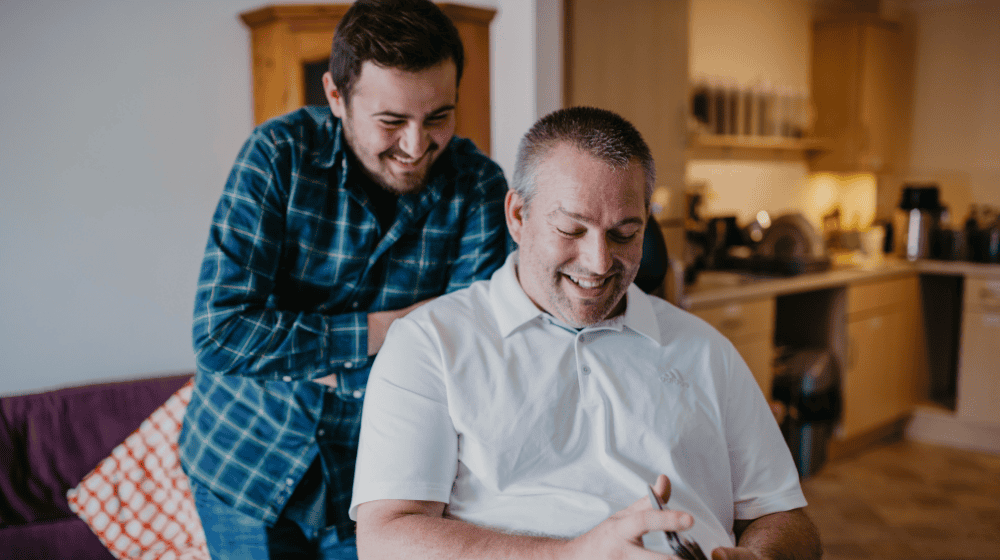An acquired brain injury is damage to the brain that happens after birth, often following an illness or accident.
We know that the impact of an acquired brain injury on you and your loved ones can be highly emotional. Through our acquired brain injury rehabilitation and support services, we provide both physical and emotional care to help you live as independently as possible.
Our experienced specialists offer flexible support through live-in care, home care, and our care and nursing homes, adapting to your changing needs and circumstances.
If you experience complications due to an acquired brain injury or your care needs are complex, we are fully equipped to adapt to your changing care needs and requirements.

What is Acquired Brain Injury Care?
Acquired brain injury care provides personalised support for people whose brain injury has occurred after birth, often as a result of an accident, stroke, infection, or medical condition. Because every brain injury is different, the level of support required is unique to each person.
Our acquired brain injury rehabilitation and support services are designed to help individuals regain independence, confidence, and quality of life. Depending on your needs, care may include 24-hour live-in care for complex or ongoing requirements, regular home care visits for daily support, or tailored care within one of our care and nursing homes.
From rehabilitation and personal care to emotional support and companionship, we adapt our approach to ensure safety, dignity, and continuity at every stage of recovery.

Our Acquired Brain Injury Support Services
Our acquired brain injury support services are designed to provide the best care for acquired brain injury, built entirely around each person’s unique needs and goals. We create bespoke care plans that focus on rehabilitation, independence, and quality of life, ensuring you or your loved one receives the right level of support at every stage of recovery.

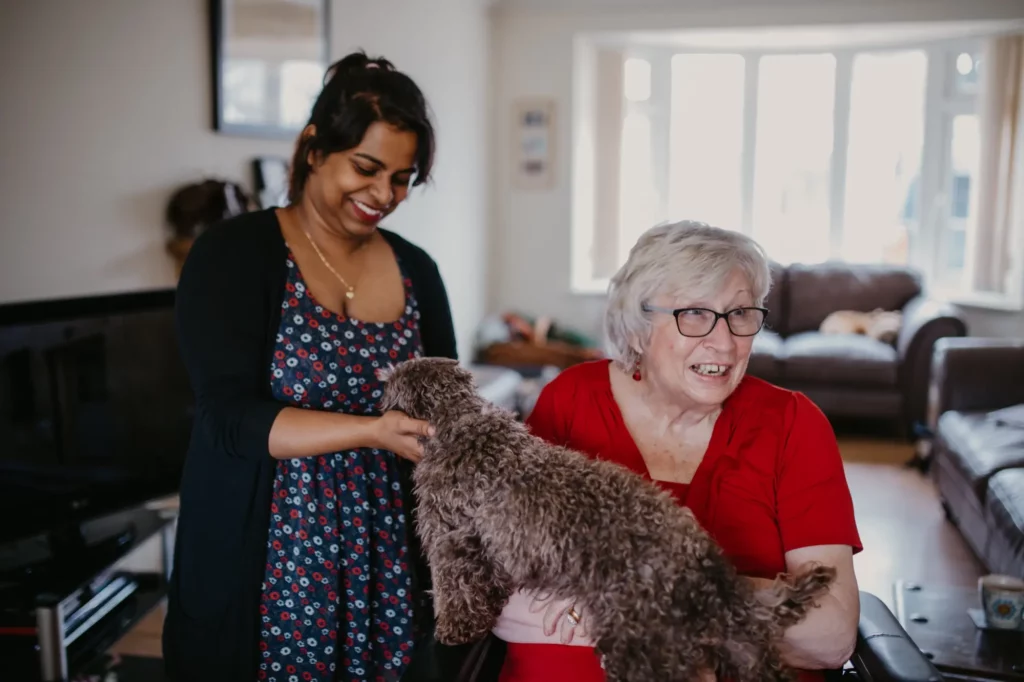
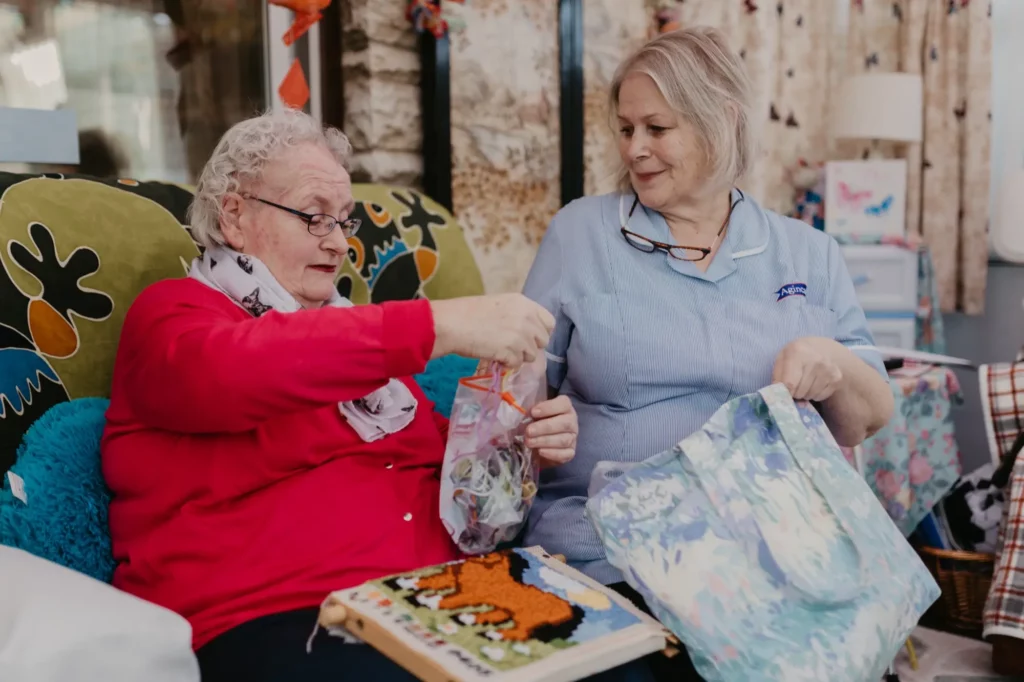
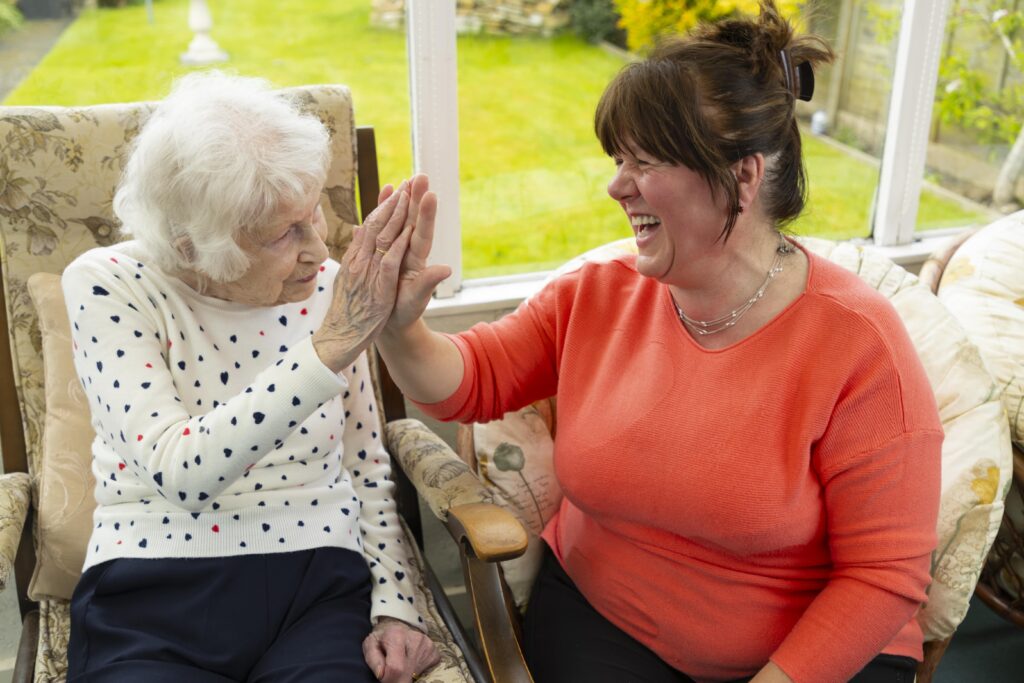

Specialist Acquired Brain Injury care
Our specialist acquired brain injury care supports people with a wide range of conditions, including traumatic brain injuries, acquired brain injuries, stroke-related brain damage, hypoxic or anoxic injuries, and tumour-related brain injuries, as well as complications from progressive neurological conditions such as multiple sclerosis, Parkinson’s disease, and Huntington’s disease. Every care plan is tailored to the individual’s physical, cognitive, and emotional needs to ensure the best recovery, independence, and quality of life.
Local Authority and NHS Partnerships
Agincare works closely with local authorities and the NHS to help people return home safely after a brain injury and receive the right level of support. We partner with over 60 local authorities and NHS trusts across England, providing fully managed, tailored care packages. These partnerships ensure continuity of care, allowing individuals to access expert support in the community and benefit from a smooth recovery journey with the right rehabilitation and ongoing assistance.
Nursing Care
We provide expert nursing care as part of our specialist acquired brain injury services, supporting clients with complex medical, personal, and technical needs. Our team delivers personalised care including medication management, clinical monitoring, assistance with daily living, and rehabilitation support, helping clients to live safely, comfortably, and as independently as possible.
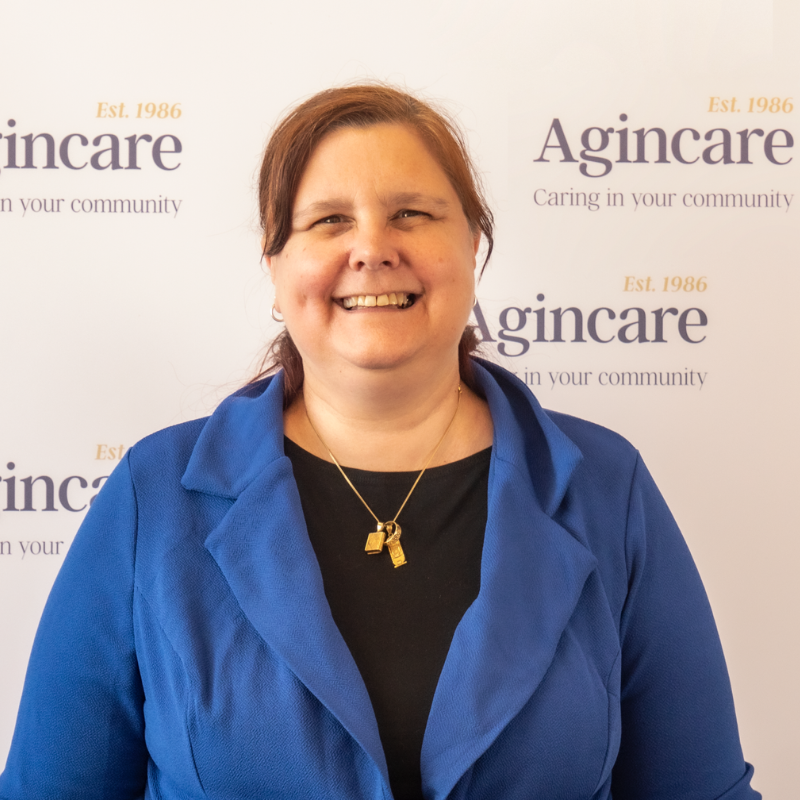
Meet Cher – Our Clinical Lead
Cher has enjoyed a long and varied career in health and social care across Europe and the UK. A registered nurse, she set up her own domiciliary care service in Monaco, later expanding it into France, supporting people with complex care needs. Before joining Agincare in April 2023, Cher worked for the DWP in disability analysis and as a Mental Function Champion. Cher oversees the clinical aspects of our live-in care service, including quality assurance, technical competency, and training.

Callum’s Story
Unfortunately, at age 16, while having fun with friends, Callum fell 30 feet. He sustained trauma to his head, memory loss and an acquired spinal cord injury. Callum spent the next two years in hospital. With his mobility declining and behavior becoming challenging, Callum’s social worker decided to research live-in care.
Hope was nearly lost when it became clear many companies weren’t able to support his needs. Thankfully, Callum found hope again. Agincare was assessed to be the best suited to support Callum. With great care, we matched him with Pawel, his new live-in care worker, who immediately began tailored training and getting to know Callum.
Soon, Callum was ready to move back home. The move was emotional, but Pawel was there for him. With Pawel’s support, Callum began a new chapter.
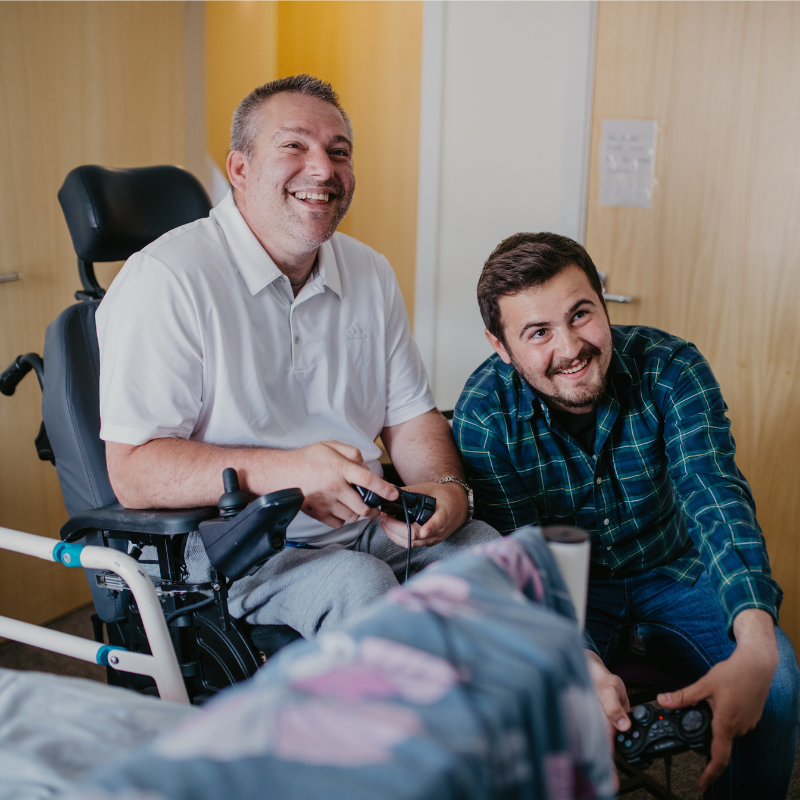

Registered Nurse Care and Nursing Associates
Our specialist acquired brain injury care services are supported by highly trained registered nurses and nursing associates, providing expert care for individuals with complex needs.
Registered Nurses deliver personalised clinical care, including support with pain management, symptom control, medication administration, and coordination with other healthcare professionals. They ensure that each person’s medical and well-being needs are met safely and effectively, supporting comfort, dignity, and quality of life.
Nursing associates work alongside registered nurses to provide day-to-day support, help with personal care and daily living activities, and assist in implementing personalised care plans. Their role bridges clinical care and hands-on support, helping individuals maintain dignity, comfort, and consistency in their care.
Together, our nursing teams provide a seamless approach to acquired brain injury care, ensuring that both medical and personal needs are met with professionalism, compassion, and expertise.
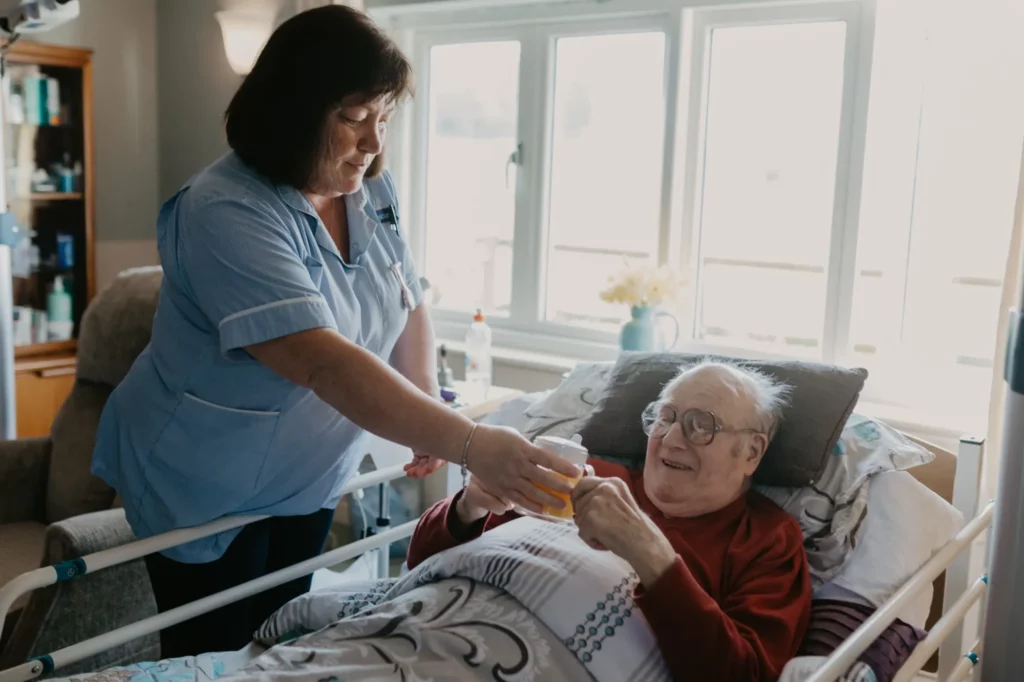

Costs of Acquired Brain Injury Care
The cost of acquired brain injury care varies depending on the type of service, level of need, and complexity of support required. Understanding acquired brain injury support costs can help you plan and choose the right care for you or your loved one.
Our live‑in care for brain injury starts from £1,135 per week, with transparent pricing and tailored quotes based on individual needs. Our experienced care advisors can guide you on paying for acquired brain injury care and help you explore funding options to ensure the right support is in place.
Already receiving acquired brain injury care and support? You could be paying more than you need to. Find out quickly with our Cost Savings Calculator, a simple tool that helps you compare your current care costs and see how much you could save with Agincare.

CQC information
When you are looking for information, be sure to visit the Care Quality Commission’s website. The CQC monitors and inspects care services and publish what they find to help you find the best care.
Funding
At Agincare, we work closely with individuals, local authorities, case managers and solicitors to ensure you receive the right funding and support for your needs. Our experienced team can guide you through available options, including local authority funding, NHS continuing healthcare and privately funded care, helping you make informed decisions with confidence and transparency.
Why choose Agincare’s Acquired Brain Injury services?
Our acquired brain injury service is trusted by thousands of families, local authorities nationwide and the NHS to deliver reliable, high-quality care. Our bespoke, fully-managed service is regulated by the CQC and rated ‘Good’.

One of the largest independent care providers in England, with decades of specialist care experience

Family-owned care provider established in 1986

Rated excellent on Trustpilot

Fully managed care provider

24/7 updates on your package of care via our app

Fully trained live-in care workers directly employed by us

Immediate and emergency starts available

Tailored support for varying levels of need, including specialist nurse-led care for complex conditions

Dedicated care supervisor to oversee your care

No lengthy contracts or exit fees – flexible, transparent support

Offer a range of services including live-in care, home care and care homes

All of our care workers are English-speaking and enhanced DBS checked
Reviews of our services




How to Arrange Care
Getting started with acquired brain injury care is simple and obligation‑free. Our step‑by‑step process makes arranging care straightforward and stress‑free:
Our expert team is here to guide you through every step with compassion and clarity, and there is no obligation to proceed.

Frequently asked questions
An acquired brain injury relates to injury to the brain that occurs after birth and is not related to either a congenital or degenerative disease. The impairment may be temporary or permanent and cause physical functional disability or psychosocial maladjustment.
An acquired brain injury may be caused by trauma or injury to the head (sometimes called a traumatic brain injury), a stroke, drugs, alcohol, poisons or when not enough oxygen gets to the brain for an extended time (for example, a near-drowning, infections such as meningitis, tumors). Similar symptoms can be caused by degenerative brain conditions such as Parkinson’s disease, Alzheimer’s disease or some other form of dementia.
As each acquired brain injury is different, every person’s symptoms will be different, however common symptoms can include:
Weakness, shaking, stiffness or poor balance
Tiredness
Changes in sleep patterns
Seizures
Headaches
Changes in vision, smell or touch
Some people experience changes in their thinking or learning abilities, including:
Problems with memory
Problems with concentration or attention
Difficulty with planning or organisation
Confusion
Difficulty with communication, such as maintaining a conversation
Some people have problems with regulating their behaviour or emotions, including:
Mood swings
Being irritable or feeling on edge
Changes in personality
All our care workers complete the nationally recognised care certificate. Specific client needs-led training is taught by our training partner Training Now, clinical colleagues and healthcare professionals.
Most people with a brain injury are expected to experience a normal life span but families and carers can play a crucial role by monitoring for any further medical problems arising post-injury, particularly after hospital.
Caring for someone with an acquired brain injury requires patience, structure, and professional guidance. Support often includes help with daily living, rehabilitation, emotional well being, and encouraging independence where possible. Specialist carers are trained to understand changes in behaviour, mobility, and communication, ensuring care is both safe and person-centred.
An acquired brain injury care plan is a personalised plan that sets out your goals, needs, and level of support. It may include rehabilitation, 24-hour live-in care, home care visits, or nursing support. The plan is developed with healthcare professionals, family members, and the person receiving care to promote recovery and independence.
Yes. Depending on the severity and lasting effects, an acquired brain injury can be classed as a disability under UK law. It can impact memory, mobility, communication, and behaviour, which means ongoing care and adjustments may be needed to support daily life.
Common signs include memory loss, difficulty concentrating, changes in mood or personality, reduced mobility, speech or communication difficulties, and fatigue. The symptoms can vary depending on the part of the brain affected and may develop immediately or over time.
A traumatic brain injury happens due to an external force, such as a fall, car accident, or head injury. An acquired brain injury is broader and includes any brain damage that occurs after birth, whether from trauma or internal causes like stroke or illness.

